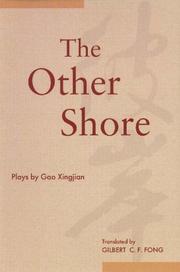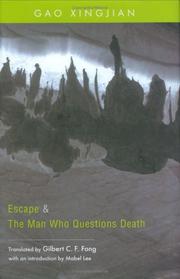| Listing 1 - 6 of 6 |
Sort by
|
Book
ISBN: 9789629963750 Year: 2008 Publisher: Hong Kong Chinese university press
Abstract | Keywords | Export | Availability | Bookmark
 Loading...
Loading...Choose an application
- Reference Manager
- EndNote
- RefWorks (Direct export to RefWorks)

ISBN: 9622018629 Year: 2000 Publisher: Hong Kong Chinese university press
Abstract | Keywords | Export | Availability | Bookmark
 Loading...
Loading...Choose an application
- Reference Manager
- EndNote
- RefWorks (Direct export to RefWorks)

ISBN: 9789629963088 9629963086 Year: 2007 Publisher: Hong Kong Chinese university press
Abstract | Keywords | Export | Availability | Bookmark
 Loading...
Loading...Choose an application
- Reference Manager
- EndNote
- RefWorks (Direct export to RefWorks)
Book
ISBN: 9882378838 9789882378834 Year: 1999 Publisher: Hong Kong The Chinese University of Hong Kong Press
Abstract | Keywords | Export | Availability | Bookmark
 Loading...
Loading...Choose an application
- Reference Manager
- EndNote
- RefWorks (Direct export to RefWorks)
Book
ISBN: 9789629963569 9629963566 Year: 2009 Publisher: Hong Kong Chinese University Press
Abstract | Keywords | Export | Availability | Bookmark
 Loading...
Loading...Choose an application
- Reference Manager
- EndNote
- RefWorks (Direct export to RefWorks)
ondertiteling --- Translation science --- Film --- globalisering --- Subtitling. Supertitling --- Dubbing of motion pictures --- Motion pictures --- Dubbing --- Ondertiteling --- Titling --- Dubbing. --- Ondertiteling. --- Ondertiteling. Boventiteling --- Cinema --- Feature films --- Films --- Movies --- Moving-pictures --- Audio-visual materials --- Mass media --- Performing arts --- Dubbing of moving-pictures --- Audio-visual translation --- History and criticism
Book

ISBN: 3110346427 3110351889 3110351870 311037417X 9783110351880 9783110351873 9783110346428 9783110374179 Year: 2014 Publisher: Berlin Boston
Abstract | Keywords | Export | Availability | Bookmark
 Loading...
Loading...Choose an application
- Reference Manager
- EndNote
- RefWorks (Direct export to RefWorks)
Like artists, important writers defy unequivocal interpretations. Gao Xingjian, winner of the Nobel Prize in literature, is a cosmopolitan writer, deeply rooted in the Chinese past while influenced by paragons of Western Modernity. The present volume is less interested in a general discussion on the multitude of aspects in Gao's works and even less in controversies concerning their aesthetic value than in obtaining a response to the crucial issues of freedom and fate from a clearly defined angle. The very nature of the answer to the question of freedom and fate within Gao Xingjian's works can be called a polyphonic one: there are affirmative as well as skeptical voices. But polyphony, as embodied by Gao, is an even more multifaceted phenomenon. Most important for our contention is the fact that Gao Xingjian's aesthetic experience embodies prose, theater, painting, and film. Taken together, they form a Gesamtkunstwerk whose diversity of voices characterizes every single one of them.
Chinese literature --- Liberty in literature. --- Fate and fatalism in literature. --- History and criticism. --- Gao, Xingjian --- Criticism and interpretation. --- Freedom in literature --- Liberty as a theme in literature --- Kao, Hsing-chien --- Cao, Hành Kiện --- 高行健 --- Xingjian, Gao --- Exile literature, China, Western Modernity.
| Listing 1 - 6 of 6 |
Sort by
|

 Search
Search Feedback
Feedback About UniCat
About UniCat  Help
Help News
News